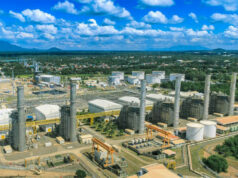LOPEZ-LED Energy Development Corp. (EDC) is preparing to participate in auctions for geothermal concessions in South American countries Chile and Peru, while undertaking initial construction work in a service area it won in Indonesia, its top official said.
“We’re preparing for the auctions in both Chile and Peru,” EDC President and Chief Operating Officer Richard B. Tantoco told reporters over the weekend.
“The system in Chile is the national grid is the one that auctions. There’s an auction next year, second quarter,” he said. “So we’re preparing.”
He said an EDC team based in Chile is in the Philippines to look into “constructibility reviews, EPC (engineering, procurement and construction) pricing reviews.”
Mr. Tantoco described the Chile concession as substantial with a potential capacity of 150 megawatts (MW). He said the foreign country has small geothermal assets in operation at around 30 MW, with an expected expansion by 28 MW and another one of the same size.
“So this (new concession) is gonna be bigger when it eventually gets built out, but it will take time,” he said.
In Peru, the concessions are bigger but its government has set to announce when it would schedule an auction, he said.
“Ang maganda sa Peru (What’s good with Peru is) they auction the capacity by technology,” he said, explaining that separate auctions are held for solar, geothermal and other energy sources with the national grid as the off-taker or the user of the output.
“And then we finally got awarded what they call in Indonesia [as] the PSPE rights,” he said, referring to the Indonesian term for preliminary geothermal survey and exploration assignment. “After all these years.”
He said a PSPE is the equivalent in the Philippines of a renewable energy service contract. He said the awarded rights have a “big potential.”
“We’re doing road constructibility surveys,” he said “If all goes well, drilling [could be] in about 18 to 24 months.”
Mr. Tantoco said EDC is open to partnership with local entities and had been meeting with potential partners in the past five to six years. He said Indonesian laws require a local company to have a stake of at least 5% in a geothermal venture.
In the Philippines, EDC is looking at two geothermal expansion ventures for inclusion in the government’s list of energy projects of national significance (EPNS), he said.
“There’s a couple that we’re hoping will move forward in due course,” Mr. Tantoco said.
He said the projects are an expansion of an existing geothermal projects on Mt. Apo in Mindanao, and an expansion of its Bacon-Manito (BacMan) project.
Asked whether these projects will vie for EPNS certification,” he said: “We’d like to [apply for EPNS] because they’re important.”
Executive Order No. 30 created the Energy Investment Coordinating Council (EICC), which through the Department of Energy approves projects deemed of national significance.
Asked when the company plans to apply, he said: “When we have a higher degree of certainty and confidence on the resource and the fact that the resource is not problematic.”
During the pre-development phase, an EPNS certification entitles the project to all the rights and privileges provided for under EO 30, including action on the application within 30 working days. The executive order was signed by the President in June 2017, while the Energy department issued its implementing rules and regulations in April 2018.
EPNS projects enjoy presumption of prior approval, which means it is presumed to have already complied with the requirements and permits from other government permitting agencies. It will be deemed approved if no action is made five days after the lapse of the 30 working-day period for processing of the application.
Mr. Tantoco said the Mindanao geothermal expansion could reach a capacity of 20 to 60 megawatts (MW), while BacMan could have about 40 to 60 MW.
“We don’t know until we drill the first well,” he said about the exact capacity of the Mindanao expansion.
The Mindanao project is the third phase of its project in the area. The first and second phases have a capacity of 52 MW and 54 MW, respectively. BacMan is also the third phase, after 120 MW in phase one and 20 MW in phase two.
EDC has a total installed energy capacity of 1,457 MW, of which 80% or 1,169 MW come from its geothermal projects. — Victor V. Saulon



